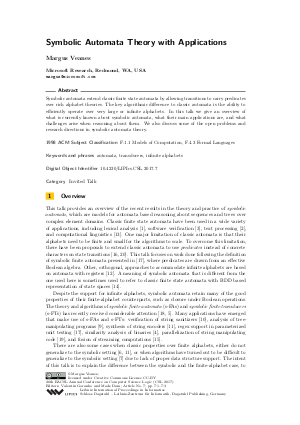Symbolic Automata Theory with Applications (Invited Talk)
Author Margus Veanes
-
Part of:
Volume:
26th EACSL Annual Conference on Computer Science Logic (CSL 2017)
Part of: Series: Leibniz International Proceedings in Informatics (LIPIcs)
Part of: Conference: Computer Science Logic (CSL) - License:
 Creative Commons Attribution 3.0 Unported license
Creative Commons Attribution 3.0 Unported license
- Publication Date: 2017-08-16
File

PDF
LIPIcs.CSL.2017.7.pdf
- Filesize: 237 kB
- 3 pages
Document Identifiers
Subject Classification
Keywords
- automaton
- transducer
- symbolic
Metrics
- Access Statistics
-
Total Accesses (updated on a weekly basis)
0PDF Downloads0Metadata Views
Abstract
Symbolic automata extend classic finite state automata by allowing transitions to carry predicates over rich alphabet theories. The key algorithmic difference to classic automata is the ability to efficiently operate over very large or infinite alphabets. In this talk we give an overview of what is currently known about symbolic automata, what their main applications are, and what challenges arise when reasoning about them. We also discuss some of the open problems and research directions in symbolic automata theory.
Cite As Get BibTex
Margus Veanes. Symbolic Automata Theory with Applications (Invited Talk). In 26th EACSL Annual Conference on Computer Science Logic (CSL 2017). Leibniz International Proceedings in Informatics (LIPIcs), Volume 82, pp. 7:1-7:3, Schloss Dagstuhl – Leibniz-Zentrum für Informatik (2017)
https://doi.org/10.4230/LIPIcs.CSL.2017.7
BibTex
@InProceedings{veanes:LIPIcs.CSL.2017.7,
author = {Veanes, Margus},
title = {{Symbolic Automata Theory with Applications}},
booktitle = {26th EACSL Annual Conference on Computer Science Logic (CSL 2017)},
pages = {7:1--7:3},
series = {Leibniz International Proceedings in Informatics (LIPIcs)},
ISBN = {978-3-95977-045-3},
ISSN = {1868-8969},
year = {2017},
volume = {82},
editor = {Goranko, Valentin and Dam, Mads},
publisher = {Schloss Dagstuhl -- Leibniz-Zentrum f{\"u}r Informatik},
address = {Dagstuhl, Germany},
URL = {https://drops.dagstuhl.de/entities/document/10.4230/LIPIcs.CSL.2017.7},
URN = {urn:nbn:de:0030-drops-76872},
doi = {10.4230/LIPIcs.CSL.2017.7},
annote = {Keywords: automaton, transducer, symbolic}
}
Author Details
References
-
Alfred V. Aho, Monica S. Lam, Ravi Sethi, and Jeffrey D. Ullman. Compilers: Principles, Techniques, and Tools (2nd Edition). Addison-Wesley, 2006.

-
Rajeev Alur, Loris D'Antoni, and Mukund Raghothaman. Drex: A declarative language for efficiently evaluating regular string transformations. ACM SIGPLAN Notices - POPL'15, 50(1):125-137, 2015.

-
Ahmed Bouajjani, Peter Habermehl, and Tomáš Vojnar. Abstract regular model checking. In CAV'04, pages 372-386. Springer, 2004.

-
Mila Dalla Preda, Roberto Giacobazzi, Arun Lakhotia, and Isabella Mastroeni. Abstract symbolic automata: Mixed syntactic/semantic similarity analysis of executables. ACM SIGPLAN Notices - POPL'15, 50(1):329-341, 2015.

-
Loris D'Antoni and Margus Veanes. Minimization of symbolic automata. ACM SIGPLAN Notices - POPL'14, 49(1):541-553, 2014.

-
Loris D'antoni and Margus Veanes. Extended symbolic finite automata and transducers. Formal Methods System Design, 47(1):93-119, August 2015.

-
Loris D'Antoni and Margus Veanes. Forward bisimulations for nondeterministic symbolic finite automata. In Axel Legay and Tiziana Margaria, editors, Tools and Algorithms for the Construction and Analysis of Systems: 23rd International Conference, TACAS 2017, volume 10205 of LNCS, pages 518-534. Springer, 2017.

-
Loris D'Antoni and Margus Veanes. The power of symbolic automata and transducers. In Computer Aided Verification, 29th International Conference (CAV'17). Springer, 2017.

-
Loris D'Antoni, Margus Veanes, Benjamin Livshits, and David Molnar. Fast: A transducer-based language for tree manipulation. ACM TOPLAS, 38(1):1-32, 2015.

-
Pieter Hooimeijer, Benjamin Livshits, David Molnar, Prateek Saxena, and Margus Veanes. Fast and precise sanitizer analysis with BEK. In Proceedings of the 20th USENIX Conference on Security, SEC'11, 2011.

-
Qinheping Hu and Loris D'Antoni. Automatic program inversion using symbolic transducers. In Proceedings of the 38th ACM SIGPLAN Conference on Programming Language Design and Implementation, PLDI 2017, pages 376-389, 2017.

-
Amaldev Manuel and Ramaswamy Ramanujam. Automata over infinite alphabets. In Deepak D'Souza and Priti Shankar, editors, Modern Applications of Automata Theory, pages 529-554. World Scientific, 2012.

-
Mehryar Mohri. Finite-state transducers in language and speech processing. Computational Linguistics, 23(2):269-311, 1997.

-
Kristin Y. Rozier and Moshe Y. Vardi. A multi-encoding approach for LTL symbolic satisfiability checking. In FM'11, pages 417-431, 2011.

-
Olli Saarikivi, Margus Veanes, Todd Mytkowicz, and Madan Musuvathi. Fusing effectful comprehensions. In Proceedings of the 38th ACM SIGPLAN Conference on Programming Language Design and Implementation, PLDI 2017, pages 17-32. ACM, 2017.

-
Gertjan van Noord and Dale Gerdemann. Finite state transducers with predicates and identities. Grammars, 4(3):263-286, 2001.

-
Margus Veanes, Peli de Halleux, and Nikolai Tillmann. Rex: Symbolic regular expression explorer. In ICST'10, pages 498-507. IEEE, 2010.

-
Margus Veanes, Pieter Hooimeijer, Benjamin Livshits, David Molnar, and Nikolaj Bjørner. Symbolic finite state transducers: Algorithms and applications. ACM SIGPLAN Notices - POPL'12, 47(1):137-150, 2012.

-
Margus Veanes, Todd Mytkowicz, David Molnar, and Benjamin Livshits. Data-parallel string-manipulating programs. ACM SIGPLAN Notices - POPL'15, 50(1):139-152, 2015.

-
Bruce W. Watson. Extended Finite State Models of Language, chapter Implementing and using finite automata toolkits, pages 19-36. Cambridge U. Press, 1999.

